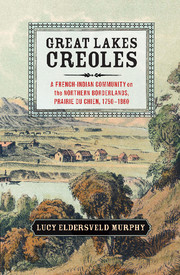 Great Lakes Creoles
Great Lakes Creoles Book contents
- Frontmatter
- Dedication
- Contents
- List of Tables
- List of Figures
- Acknowledgments
- Introduction
- 1 “The Rightful Owners of the Soil”
- 2 “To Intermeddle in Political Affairs”
- 3 “Damned Yankee Court and Jury”
- 4 Public Mothers
- 5 “A Humble … People”
- 6 Blanket Claims and Family Clusters
- Conclusion
- Epilogue
- Index
- References
3 - “Damned Yankee Court and Jury”
More New Institutions, Keeping Order and Peace
Published online by Cambridge University Press: 05 September 2014
- Frontmatter
- Dedication
- Contents
- List of Tables
- List of Figures
- Acknowledgments
- Introduction
- 1 “The Rightful Owners of the Soil”
- 2 “To Intermeddle in Political Affairs”
- 3 “Damned Yankee Court and Jury”
- 4 Public Mothers
- 5 “A Humble … People”
- 6 Blanket Claims and Family Clusters
- Conclusion
- Epilogue
- Index
- References
Summary
On May 11, 1824, a grand jury in Prairie du Chien indicted Governor Lewis Cass’s brother for assault. Captain Charles L. Cass of the Fifth Regiment, U.S. Infantry, stationed at Fort Crawford had apparently attacked Joseph Glass, who was in jail at the time. The Glass family, of course, had been the objects of community assistance (mentioned in the previous chapter) after the father’s incarceration had caused them economic distress and officials had threatened to take the children from their mother. Public pressure had caused the county commission to find a way for Glass to get out of jail and the children to stay with their parents.
The mercy shown to Joseph Glass was one method of resolving the whole affair, but there was also the second issue, the matter of the beating he had received from Charles Cass on January 12. So Prairie du Chien community members used another new institution, the grand jury, to address the violent behavior of Captain Cass. As they had with the new electoral system, the habitants found ways to make the unfamiliar court system both familiar and useful. They could have let the matter go out of deference to the governor. After all, Charles Cass wasn’t in Prairie du Chien anymore by the time the grand jury met. Five months after the attack when the circuit court finally convened, he seems to have left town after resigning from the army. But the predominantly Creole grand jury was not going to let the matter go: they were still angry.
- Type
- Chapter
- Information
- Great Lakes CreolesA French-Indian Community on the Northern Borderlands, Prairie du Chien, 1750–1860, pp. 108 - 147Publisher: Cambridge University PressPrint publication year: 2014
